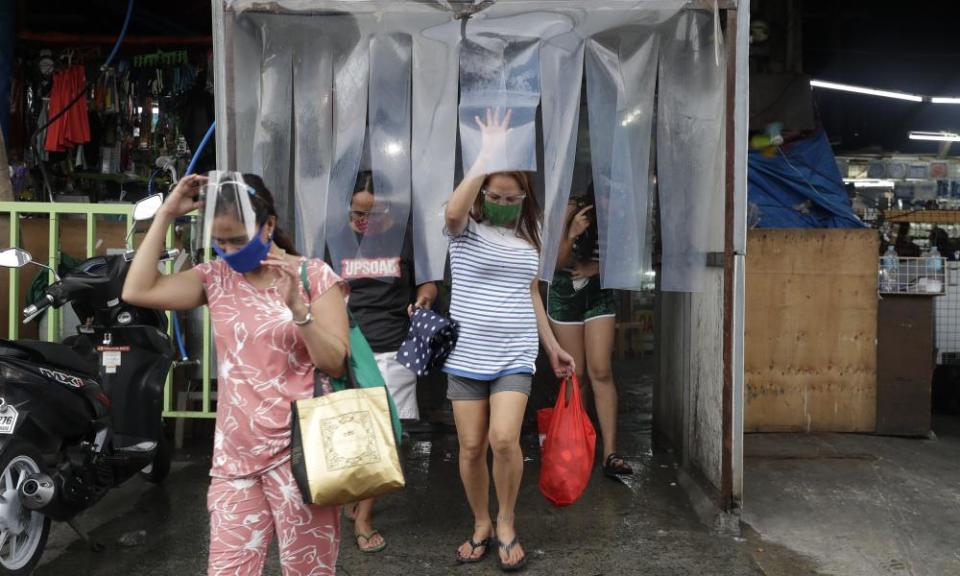Millions in Manila back in lockdown as Duterte loses control of coronavirus spread

More than 27 million people have been put back into lockdown in and around the Philippines’ capital, as stricter measures are imposed in an attempt to halt the country’s spiralling coronavirus case numbers.
The measures were reintroduced on Tuesday after the country’s infection tally topped 100,000 and a coalition of health groups issued a “distress signal” urging President Rodrigo Duterte to act. “Our healthcare workers should not bear the burden of deciding who lives and who dies,” they said in an open letter at the weekend, warning the health system was at risk of being overwhelmed.
Two major government hospitals in Manila city have been forced to close temporarily because infections among health workers have escalated so sharply, while some private hospitals are turning away patients due to bed shortages.

Duterte, apparently rattled by medics’ public warning over case numbers, responded by lashing out at health staff. “If you mount a revolution, you will give me a free ticket to stage a counter-revolution. How I wish you would do it,” he said in a late-night address on Sunday.
Related: Coronavirus lockdown could lead to 214,000 extra babies in the Philippines
His speech followed comments last week pushing unscientific and dangerous health advice, suggesting poorer people should use petrol to wash their face masks. “If alcohol isn’t available, especially for the poor, just go to a gasoline station, and use [gas] to disinfect,” he said. “I am not joking. I am not joking.”
The Philippines has so far recorded 106,330 cases, a number that is rapidly rising. On Monday, the country reported a record number of infections for a fourth successive day. It is likely the Philippines will soon overtake Indonesia, the world’s fourth most populous country, to become the worst-hit nation in south-east Asia. Testing rates in both countries remain low. There have so far been 2,104 deaths in the Philippines.
On Tuesday, the commuter trains, buses and other public vehicles stayed off the main roads and police were again staffing checkpoints to restrict public travel. Most domestic flights to and from the capital were cancelled, and night curfews will return in places. The lockdown will remain in place for two weeks.
In a state of the nation address last week, Duterte promised to respond to the virus “with the same fervour” as he had pursued the war on drugs, a campaign in which as many as tens of thousands of people are feared to have died in extra-judicial killings. He told the public not to despair, stating: “The vaccine is around the corner. Sooner and not later, the virus that gobbled up thousands of lives will itself be laid to rest.”
The World Health Organization has warned that a vaccine will not be available until 2021, if at all.

There is growing speculation that Duterte’s popularity, which has remained high even during the brutal drugs war, could be undermined by his handling of the pandemic. Despite presenting himself as a strongman leader who gets things done, analysts say he has failed to produce a coherent national response to either the economic or health crises facing the country.
“I would be very surprised if his approval ratings are not negatively affected by his response to the pandemic. Unlike the war on drugs, and the alleged extra judicial killings, this pandemic has affected everyone,” said Jean Encinas Franco, associate professor of political science at the University of the Philippines.
An earlier lockdown in the Philippines, which caused misery for the poorest and was strictly enforced by the military, failed to stop the outbreak. Some argued that the government attempted to reopen the economy too quickly, and without adequate measures to protect against a surge in infections.
“The Philippines has had the longest, strictest lockdown in the world but the government of Duterte wasted all that effort,” said Antonio La Viña, former dean of the Ateneo School of Governance. He added that Duterte has adopted a “coercive and blame the people approach” which has been both divisive and ineffective.
The country’s economy has taken a major hit during the pandemic. The unemployment rate has risen from a 14-year-low in October 2019, to 17.7%, with economists warning this could be an underestimate. Meanwhile, remittances from overseas workers, a major source of income in the country, plummeted by almost 19.3% in May. With the reintroduction of quarantine measures, hopes of building a recovery have been dashed.

